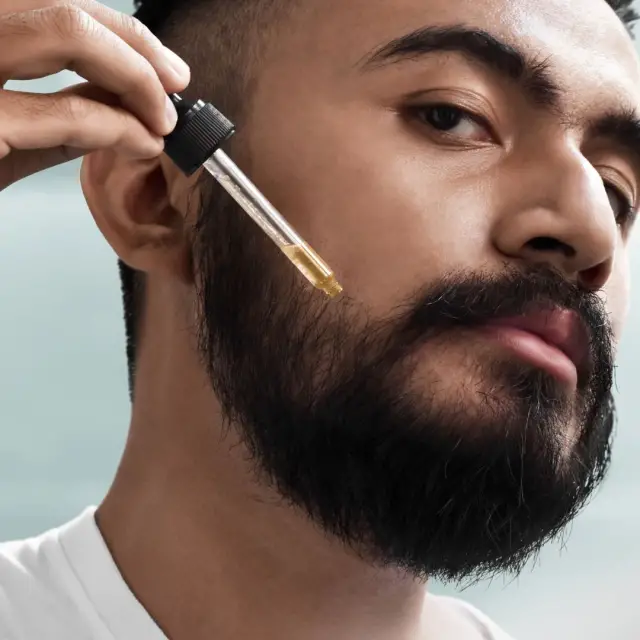The beard has been a symbol of masculinity, wisdom and style for centuries. However, not all men find it easy to grow a thick, healthy beard. Many face problems such as uneven patches, slow growth and weak hair.
Beard growth is largely determined by genetic and hormonal factors. The main hormone responsible is testosterone and its derivative, dihydrotestosterone (DHT). These hormones influence the growth phase of the hair follicle. Below we detail the phases of facial hair growth:
Phases of Facial Hair Growth
Anagen Phase: It is the active phase of hair growth, which can last from 2 to 6 years. During this stage, hair grows continuously.
Catagen Phase: It is a transition phase that lasts about 2 to 3 weeks. At this stage, the hair follicle shrinks and growth stops.
Telogen Phase: It is the resting phase that lasts from 1 to 3 months. At the end of this phase, the hair falls out and is replaced by new hair in the anagen phase.
Factors That Affect Beard Growth
Genetics
Genetics plays a crucial role in beard growth. If the men in your family have thick beards, chances are you can have a similar beard too. However, if genetics are not in your favor, there are ways to maximize your growth potential.
Hormones
Testosterone and DHT are the main hormones responsible for facial hair growth. Low levels of these hormones can result in slower or less dense growth. Consulting a doctor can be helpful to evaluate and adjust your hormone levels if necessary.
Age
Age also influences beard growth. Many men do not develop a full beard until their 30s. Patience is key, as facial hair can continue to thicken over time.
Lifestyle
Factors such as diet, exercise, sleep, and stress reduction also affect hair growth. A healthy lifestyle can improve the density and growth speed of your beard.
Methods to Grow a Beard
Food and Supplements
A balanced diet rich in nutrients is essential for hair growth. Here are some essential nutrients that can help:
Proteins: Hair is mainly composed of keratin, a protein. Consuming enough protein is crucial for hair growth.
Vitamins: Vitamins A, C, D and E, as well as the B complex, are essential for hair health. Biotin, in particular, is known to promote hair and nail growth.
Minerals: Zinc and iron are important minerals that support hair growth.
Omega-3 Fatty Acids: These fatty acids help maintain healthy skin and promote hair growth.
Recommended Supplements
Biotin: Known for its ability to strengthen hair and nails.
Fish Oil: Rich in omega-3 fatty acids.
Multivitamins: They ensure that you get all the necessary vitamins and minerals.
Exercise and Lifestyle
Regular exercise not only improves your overall health, but it can also increase your testosterone levels. Activities such as weight lifting and high-intensity workouts are especially beneficial. Additionally, getting adequate sleep and reducing stress are also crucial. Stress can increase levels of cortisol, a hormone that can inhibit hair growth.
Beard Care and Maintenance
Taking proper care of your beard is essential to promote its growth and keep it healthy. Here are some tips:
Cleaning
Wash your beard regularly with a mild shampoo. This removes dirt and excess oil, allowing the hair follicles to breathe.
Hydration
Apply beard oils to keep hair and skin hydrated. Jojoba and argan oils are especially good for this purpose.
Cutout
Although it may seem counterproductive, trimming your beard regularly helps keep it healthy. Eliminates split ends and promotes more uniform growth.
Growth Stimulants
There are specific products designed to stimulate beard growth. Here are a few you can consider:
Minoxidil
Originally used to treat baldness, minoxidil has been shown to be effective in stimulating facial hair growth. Apply a small amount to the desired areas and be consistent in its use.
Derma Roller
A derma roller is a device with small needles that are passed over the skin. This process, known as microneedling, stimulates blood circulation and can promote hair growth.
Home remedies
There are several home remedies that can help stimulate beard growth:
Eucalyptus oil
Eucalyptus oil is known for its stimulating properties. Mix a few drops with a carrier oil, such as coconut oil, and massage your beard regularly.
Aloe vera
Aloe vera is great for the skin and can help keep hair follicles healthy. Apply aloe vera gel directly to your beard and let it sit for about 15 minutes before rinsing.
Changes in lifestyle
Adopting a healthy lifestyle is key to facial hair growth:
Balanced Diet: Eat foods rich in proteins, vitamins and minerals.
Regular Exercise : Increases testosterone levels and improves blood circulation.
Adequate Sleep: Sleeping between 7-9 hours per night is crucial for cell regeneration.
Stress Reduction: Practices such as meditation and yoga can help reduce stress.
If you don't see improvements after following these tips, it may be helpful to consult a dermatologist or endocrinologist. These specialists can offer medical treatments or evaluate possible hormonal imbalances.
Growing a thick, healthy beard requires patience and dedication. Although genetics play an important role, there are many methods and practices that can help you maximize your growth potential. Remember that consistency is key and that results may take time to appear, but with perseverance, you will achieve the beard of your dreams.
